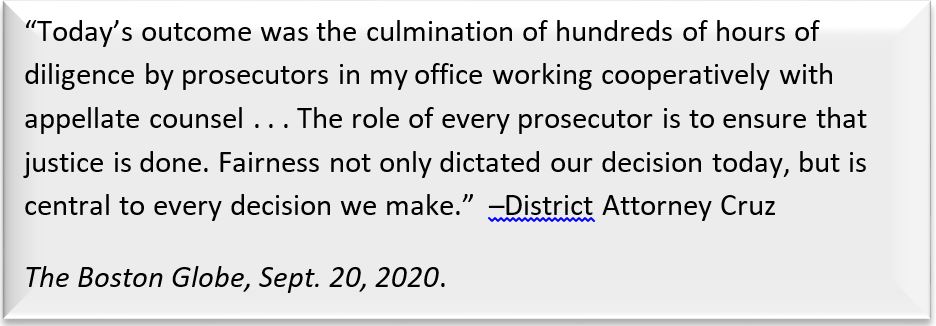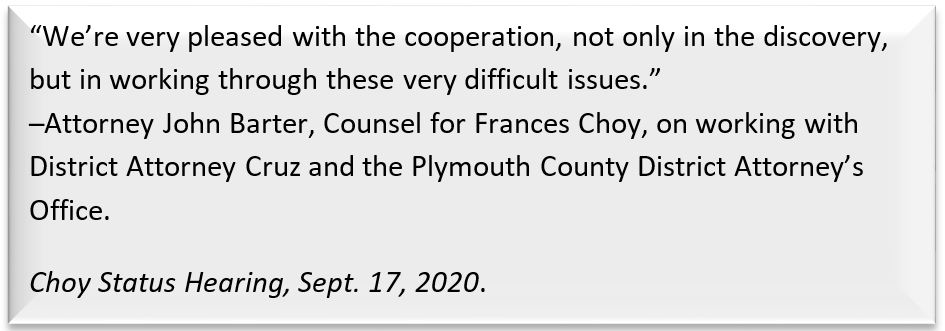
The Plymouth County District Attorney’s Office embraces the greater moral duties of a prosecutor as the representative of the people, recognizing that the government has a broader and deeper duty, to seek justice, including remedying injustices. Our “interest, therefore, in a criminal prosecution is not that [he] shall win a case, but that justice shall be done. As such, he is in a peculiar and very definite sense the servant of the law, the twofold aim of which is that guilt shall not escape or innocence suffer.” Berger v. United States, 295 U.S. 78, 88, 55 S. Ct. 629, 633, 79 L. Ed. 1314 (1935).
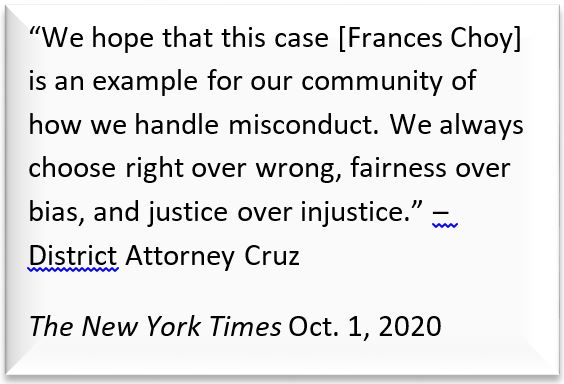
As a prosecutor for 23 years, District Attorney Timothy J. Cruz has been the one constant in Plymouth County while crimes rates, homicide rates, and incarceration rates have decreased. The Plymouth County District Attorney’s Office makes a difference, every single day, working to protect the citizens of Plymouth County by reducing criminal activity not only through prosecution, but also by implementing prevention and intervention strategies. Accountability is the hallmark of District Attorney Timothy Cruz’s Office. Not only does the Office strive to hold accountable those who victimize others, but the Office equally strives to be the best version of itself, by holding itself accountable to fairness, working hard, treating others with respect, embracing diversity, and promoting learning. An accountable criminal justice system fosters community trust.
The Plymouth County District Attorney’s Conviction Integrity Unit is dedicated to investigating and recommending necessary action in cases in which a claim of wrongful conviction or actual innocence has been brought to the attention of the District Attorney. When an erroneous conviction occurs, the District Attorney is often the right person, who can take remedial action for the defendant and community. District Attorney Cruz is committed to such accountability when there is the lack of fairness and integrity that is so crucial to the community’s trust in the criminal justice system.
The criminal justice system sets a high bar to conviction: a trial before a jury of members of the community, at which proof beyond a reasonable doubt must be established, based on reliable, credible evidence that is only admitted with judicial approval. Nonetheless, like all human undertakings and institutions, sometimes there are errors that require investigation, intervention and extraordinary relief.
Whether the claim of innocence or wrongful conviction is due to newly discovered evidence, such as cutting edge DNA testing on old cases, or due to mistaken identifications, or even mistakes by the court, civilian witnesses, forensic experts, defense counsel, prosecutors or the police, all such claims require careful review.
Claims of innocence and wrongful conviction are reviewed by the Chief Legal Counsel for Ethics, Integrity and Policy, assisted by other prosecutors and investigators. Such reviews are undertaken as cooperative efforts with defendants and defense counsel, in a spirit of reciprocity in the pursuit of justice.
Claims of innocence and wrongful conviction can be submitted at this link for further review: PlymouthDA.ConvictionIntegrity@State.Ma.Us
Plymouth County District Attorney’s Office Brady Disclosure Policy
Brady Database – Public Disclosure
The Police Officers Standards and Training Commission was established as part of the criminal justice reform enacted in Chapter 253 of the Acts of 2020.
In enacting this public law the Legislature also amended the public records laws of the Commonwealth as follows:
SECTION 2. Clause Twenty-sixth of section 7 of chapter 4 of the General Laws is hereby amended by striking out subclause (c), as appearing in the 2018 Official Edition, and inserting in place thereof the following subclause:-
c) personnel and medical files or information and any other materials or data relating to a specifically named individual, the disclosure of which may constitute an unwarranted invasion of personal privacy; provided, however, that this subclause shall not apply to records related to a law enforcement misconduct investigation.
Notwithstanding this change, there remains a great deal of uncertainty regarding what parts of a police officer’s personnel file, which may contain false as well as truthful allegations of mistakes or misconduct, are now a matter of public record.
While we await further guidance from the Supreme Judicial Court and the POST Commission about what information is to be publicly disclosed, the District Attorney has chosen to make public that part of the Brady Database that includes convictions or admissions that are sufficient to sustain a finding of guilt (often called continuances without a finding), as well as judicial findings that specifically call into question an officer’s credibility as a witness, as well as internal affairs proceedings after which the officer is no longer employed by the department. Consistent with the presumption of innocence afforded to all people, as well as the restrictions regarding Criminal Offender Record Information (CORI) charges that were dismissed, or that are still pending, including on-going internal affairs matters of which this office is aware, will not be publicly disclosed.
The District Attorney also notes that the various departments have submitted summary histories of all officers to the POST Commission, which Commission must now determine whether and to what extent those summaries are public records. We must defer to the Commission before we share further information with the public about these histories.
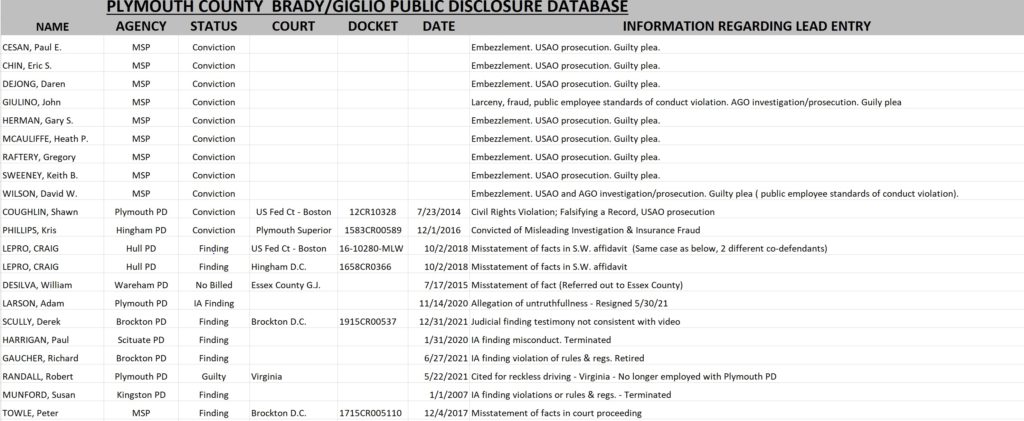
- Plymouth County District Attorney’s Office Brady Disclosure Policy
- Commonwealth’s Discovery Notice
- Frequently Asked Questions: Mandatory Disclosure Notice Concerning Law Enforcement Witnesses
Media Coverage:
Commonwealth vs. William Allen
Allen Makes Commutation Case Before Receptive Council
Councilor To Allen: “You’re Gonna Get A Commutation”
State House News Service
Sam Doran
2/2/22 9:09 PM
STATE HOUSE, BOSTON, FEB. 2, 2022…..While there were some divergent opinions about whether justice was served 27 years ago when William Allen was sentenced to life without parole on a first-degree murder charge, not a single voice spoke up Wednesday to say that Allen should still be behind bars in 2022.
Witnesses lined up to tell the Governor’s Council of Allen’s character and good works in prison, from longtime supporters and friends to Devin McCourty of the New England Patriots, who met Allen more recently and was inspired by his case.
The council, which is weighing a recommended commutation to second-degree murder that would make Allen eligible for parole and a return to the Brockton community after nearly three decades, interviewed him inside the State House about topics ranging from details of the crime to what sort of life he would lead if he is released from prison.
And Councilor Robert Jubinville, who represented Allen at trial in the 1990s and chaired Wednesday’s hearing, told his former client that his commutation was a sure thing.
“You’re gonna get this commutation because I think everybody on this board is gonna vote for you, for what you did while you were in there,” the Milton Democrat said.
Plymouth County District Attorney Timothy Cruz testified via WebEx in support of Allen’s commutation, calling his situation “truly unprecedented.”
Allen was tried as a joint venturer along with an accomplice, Rolando Perry, in the felony murder. It was Perry who stabbed and killed an occupant of the apartment, Purvis Bester, during the robbery. While Allen refused to take a second-degree murder plea at the time, Perry did and is now out on parole.
Cruz said the current sentence “represented the appropriate and just outcome at the time that it was imposed, but a number of changes have taken place over the last 27 years to require us to revisit whether this outcome remains just at this time,” adding that the law regarding felony murder has changed and it is unclear whether Allen would be convicted today.
Jubinville said he thought the sentence “was an injustice then” and for all the 27 years Allen has been incarcerated. He said he recalled prosecutor Paul Dawley, who is now chief justice of the District Court, “almost crying” because Allen would not take the plea deal.
Said Councilor Terry Kennedy: “You would’ve been in jail for a long time, no matter what. So I don’t feel bad for the time that you did, for what happened. But I do think that you should get out.”
Councilor Mary Hurley, a former judge, told him that “it’s not what you did that got you there, it’s what you’ve done since you’ve been there — that is the reason that you merit a commutation.”
Cruz cited support from Bester’s family for commuting the sentence, along with Allen’s work as a mentor to patients at Bridgewater State Hospital and a 27-year incarceration record that is free of any disciplinary reports for acts of violence.
“We also looked at Mr. Allen’s growth as an individual, and it is undeniable that he has taken countless steps toward rehabilitating himself and giving back to others. This kind of initiative is rare in someone facing a life sentence without parole,” the Republican prosecutor said.
William Allen’s case for commutationopens in a new window
Commonwealth Magazine
September 19, 2021
Remarks Paraphrased From the Testimony of Plymouth County District Attorney Timothy J. Cruz in the Matter of William Allen’s Petition for Commutationopens in a new window
June 15, 2021
Findings of Plymouth County District Attorney Timothy J. Cruz Regarding Officer Involved Shooting on December 28, 2020 in Brockton, Massachusettsopens in a new window
May 27, 2021
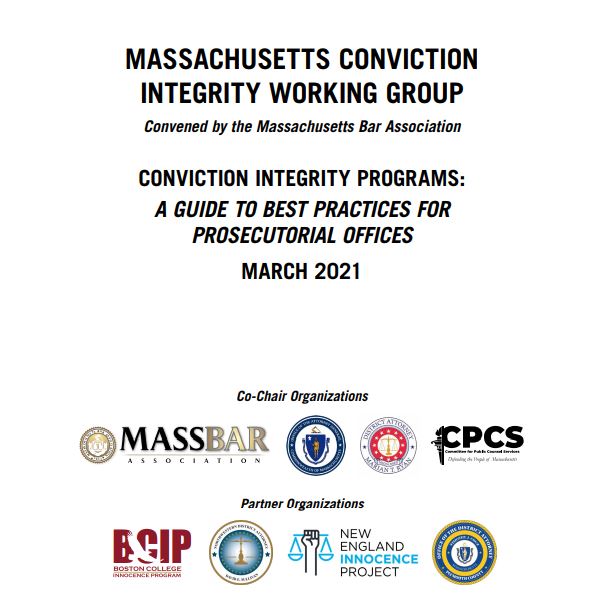
Massachusetts Conviction Integrity Working Group
“I just finished reading the report from the MCIWG. This is a tremendously important addition to and advancement of the literature available for conviction review units wanting to follow the best and most ethical guidelines. The work that you all took on and the diligence with which you carried out the task is clear in the well-researched recommendations. As the Quattrone Center continues to work to support the development of conviction review units responsive to the needs of their communities and justice, this will be an invaluable resource. Please express our gratitude and deep appreciation to all of the Working Group members.” Marissa Bluestein, Quattrone Center.
March 2021
Findings of Plymouth County District Attorney Timothy J. Cruz Regarding Officer Involved Fatal Shooting on February 16, 2020 in Byfield Massachusetts
Report of Certified Force Science Analyst Cameron Deaneopens in a new window
January 14, 2021
District Attorney Cruz Agrees to Move to Vacate Frances Choy’s Conviction and Enters a Nolle Prosequi to End Any Further Prosecution.
- Commonwealth’s Response to Motion for Post-Conviction Relief
- Memorandum of Decision and Order on Defendant Frances Choy’s Motion for Post-Conviction Relief: Judge Giles Findings and Rulings
- Commonwealth’s Nolle Prosequi
